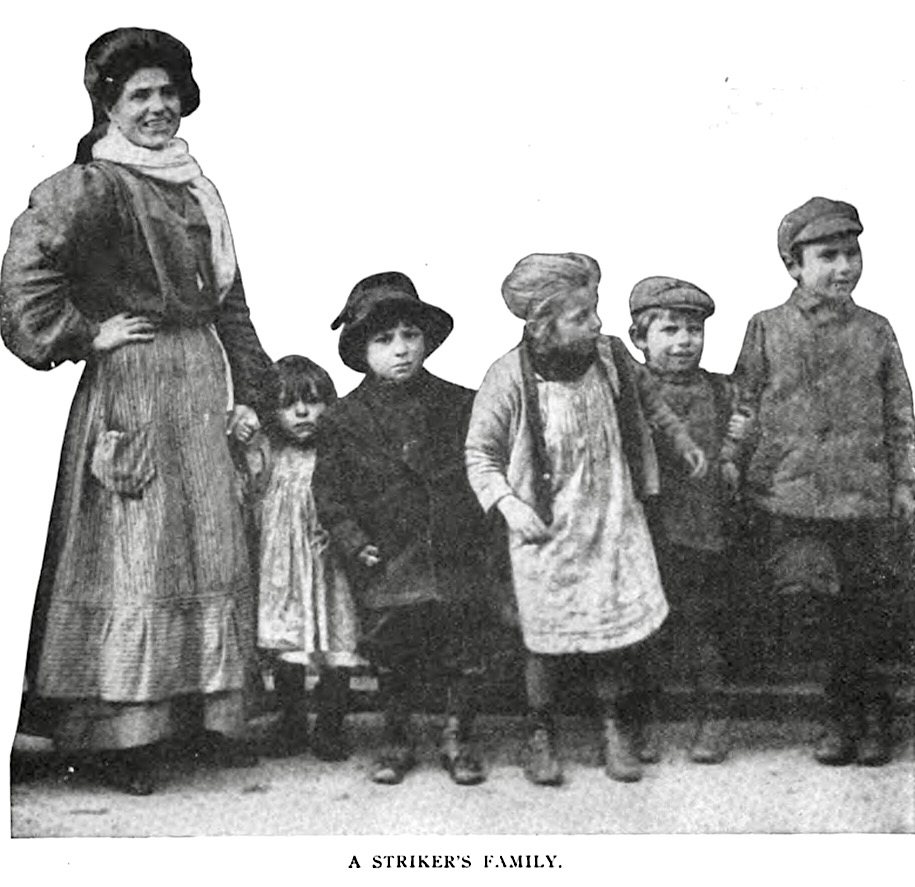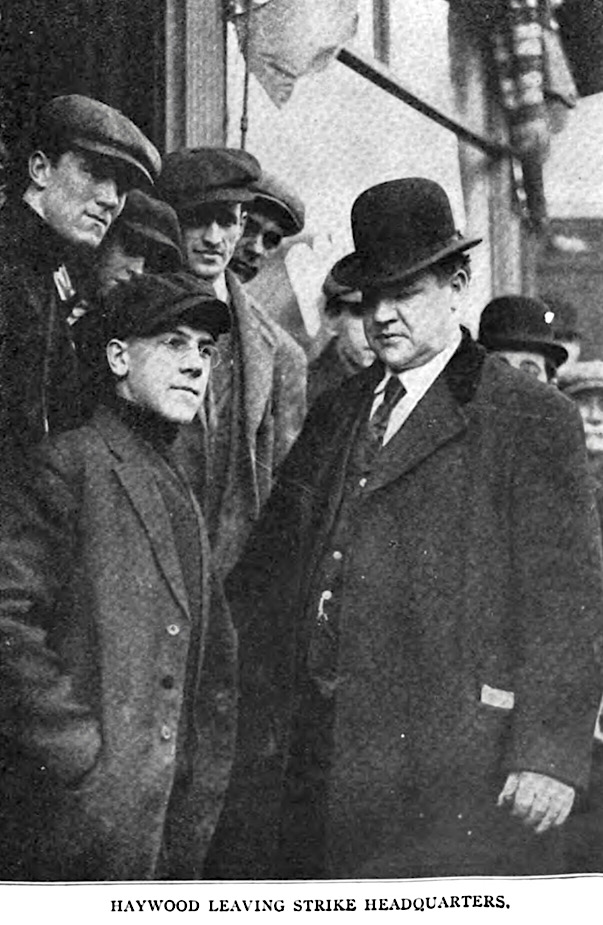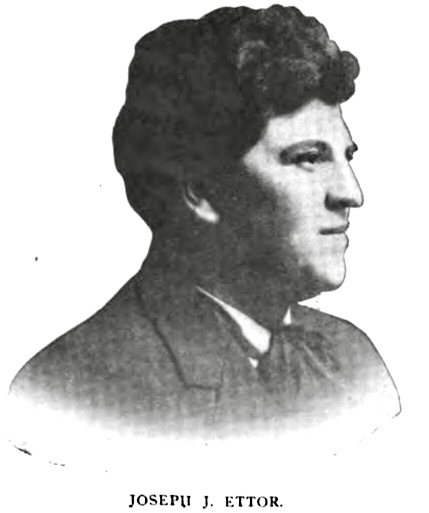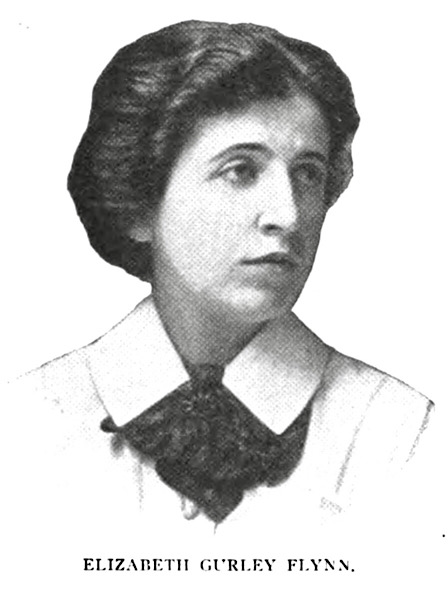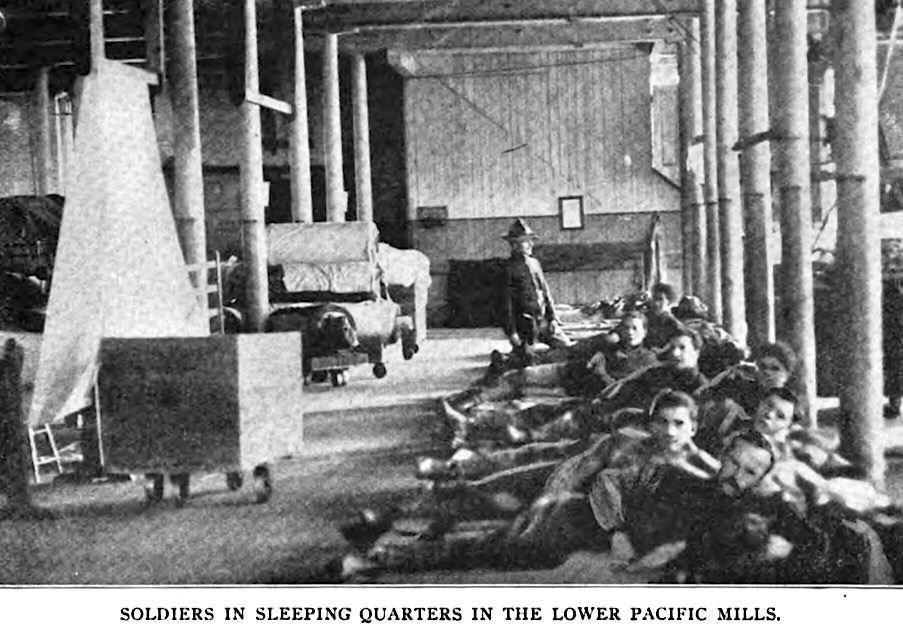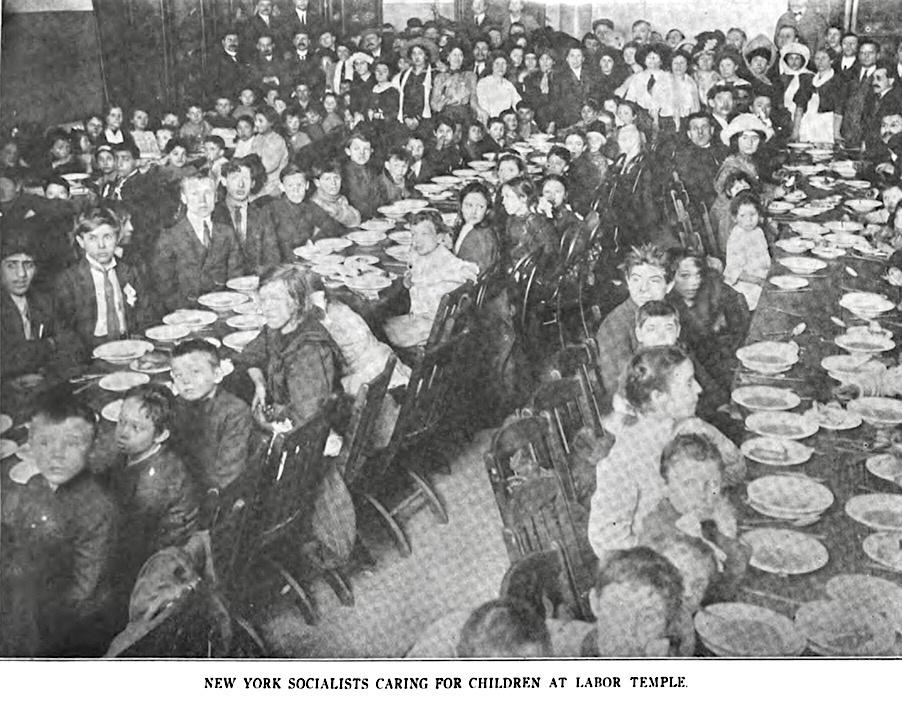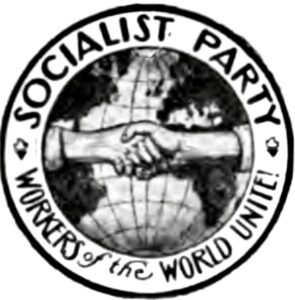 —————
—————
Hellraisers Journal – Wednesday March 6, 1912
“The Battle for Bread at Lawrence” by Mary E. Marcy, Part III
From the International Socialist Review of March 1912
” The Battle for Bread at Lawrence”
-by Mary Marcy, Part III
———-
[Wonderful Solidarity]
The wonderful solidarity displayed by the strikers has surprised everybody. There are more languages spoken in the confines of Lawrence than in any other district of its size in the world. But in spite of these barriers, the strike was an almost spontaneous one and seventeen races, differing widely in speech and custom, rose in a concerted protest. Lacking anything like a substantial organization at the outset, they have clung together in furthering a common cause without dissension. Too much credit cannot be given Comrades Joseph Ettor and Wm. D. Haywood in the splendid work of organization and education they have carried on in Lawrence.
Says the Outlook for February 10:
Haywood does not want unions of weavers, unions of spinners, unions of loom-fixers, unions of wool-sorters, but he wants one comprehensive union of all textile workers, which in time will take over the textile factories, as the steel workers will takeover the steel mills and the railway workers the railways. Haywood interprets the class conflict literally as a war which is always on, which becomes daily more bitter and uncompromising, which can end only with the conquest of a capitalistic society by proletarians or wage-workers, organized industry by industry.
Haywood places no trust in trade agreements, which, according to his theory, lead merely to social peace and “put the workers to sleep.” Let the employer lock out his men when he pleases, and let the workmen strike when they please. He is opposed to arbitration, conciliation, compromise; to sliding scales, profit-sharing, welfare work; to everything, in short, which may weaken the revolutionary force of the workers. He does not ask for the closed shop or the official recognition of the union, for he has no intention of recognizing the employer. What he desires is not a treaty of industrial peace between the two high contracting parties, but merely the creation of a proletarian impulse which will eventually revolutionize society. Haywood is a man who believes in men, not as you and I believe in them, but fervently, uncompromisingly, with an obstinate faith in the universal good will and constancy of the workers, worthy of a great religious leader. That is what makes him supremely dangerous.
Governor Foss, himself one of the mill owners, and Mayor Scanlon have never before met “strike leaders” like Ettor and Haywood. This is probably their first experience with representatives of labor who cannot be “reached” in some way. More than one attempt was made to come to an “understanding” with Ettor. It was even shown how he could persuade the strikers to accept a few of their demands, call off the strike and make himself the most popular labor leader in the country with the mill companies, but in preference, [of Ettor] the Boston Herald says:
He is to be found at almost any hour in some long low-ceiled hall talking earnestly to row upon row of set faces which strangely contrast the racial peculiarities of many quarters of the earth.
Talking, talking, always talking on One Big Union. It was agreed by the mill owners long before Haywood’s arrival that he was the worst possible man they could have opposing them.
Haywood and some of the strikers conferred with the Investigating Committee when it came to Lawrence.
Speaker [Grafton D.] Cushing [of the Massachusetts House of Representatives] opened the meeting by saying that they came informally, being there on their own responsibility, without any particular authority, for the purpose of finding out conditions, preparatory to acting on various bills, which had been introduced relative to the industrial struggle in Lawrence.
One of the bills was introduced in the house by a Socialist, Representative Morrell [Charles H. Morrill] of Haverhill, while Senator [Erson B.] Barlow of Lowell introduced a bill in the senate.
Unfortunately none of the investigators themselves were Socialists. In reporting the investigation, the Outlook correspondent, February 10, says:
I have rarely seen anything more sensational and dramatic than a certain quiet intellectual collision which I witnessed in the Mayor’s office at Lawrence between Haywood and a few strikers and an investigating committee of the State Legislature. It was a war of philosophies à outrance, compared to which a bloody affray between militia and strikers would have seemed puerile and insignificant. The committee, composed of men of exceptional intellectual attainments, were thrown upon the defensive. “What can your state do?” asked the strikers, almost in so many words. “If you find one party wrong, can your state force it to do right? Can you legislators be impartial as arbitrators, when you have not lived the bitter life of the workers? Would you arbitrate a question of life and death, and are the worst wages paid in these mills anything short of death? Do you investigate because conditions are bad, or because the workers broke loose and struck? Why did you not come before the strike? Can you weave cloth with the bayonets of your militia, or spin with the clubs of your policemen? What can your State of Massachusetts do to make wrong right for the workingmen who form the bulk of your citizens?
Haywood quoted some pay envelopes received by spinners at the Wood mill, $6.99, $6.74, $5.45, $6.30 and $8.25, the latter being for extra work. He also called attention to the fact that on the envelope of the one marked $5.45, there was a little advice about the benefits of saving money and the name of a local bank was given advertising. He thought that this was heaping on abuse.
Mr. Haywood was asked what his idea was relative to a committee coming to Lawrence to investigate conditions here, and later to investigate conditions throughout the state.
Haywood replied:
I have no hope in a legislative investigation, as I think it will result in nothing. The workers here have broken loose and other cities are soon going to break loose, too. It is immaterial to me, however, whether or not there is a legislative investigation.
We have no hope in the two political parties which you represent, but I have no doubt that if the legislative committee comes here the strikers will give them all the information they want, and will furnish guides to bring you through the homes of the workers.
If you gentlemen desire to improve conditions here, you could do well by withdrawing the militia and urge upon the legislature, favorable action on the bill for $10,000 for the Lawrence strikers, or double that amount.
I have no question that the strikers here could improve conditions in the mills themselves, because they have the labor power.
It is a vital matter, however, and I am glad to see that it has aroused the politicians, and it is high time that they saw it was someone else other than the “upper ten” who were responsible for the prosperity of good old Massachusetts. Good will result if you go about the investigation honestly.
Representative Bothfell asked Mr. Haywood what impression in his opinion the state board of arbitration had made upon the strikers, and Haywood replied:
The state board of arbitration made a bad showing here. They could not deliver the goods. They could not get the operators into the conference.
On February 2, Ettor was arrested on a charge of complicity in the murder of Anna La Pizza [Lo Pizzo], an Italian woman who was shot during a street meeting in Lawrence, January 30. Several business men in Lawrence proved that Ettor was not present at the time of the shooting but he was refused bail. Every one recognized this as another move on the part of the mill owners to cripple the strike.
The strikers were denied the privilege of congregating to hold meetings. Col. Sweetser is reported as saying:
“I will allow no mass meetings. I will allow no parades. We are going to look for trouble—legitimate trouble from now on. We are not looking for peace now.”
On January 30 John Rami [Ramey], an 18-year-old Syrian striker, was bayoneted by a member of a squad of Massachusetts militia. The boy was stuck through the back like a pig as he ran with seven companions before an unprovoked charge of the state soldiers. He died a few hours afterward in the Lawrence hospital. Many other strikers were injured by the soldiers.
But in spite of these disasters and the threat of Col. Sweetser, Elizabeth Gurley Flynn gathered together 12,000 strikers and marched with them down to hold a meeting on the commons. The soldiers faced them with bayonets, but yielded before the determined crowd of men and women.
At present a reign of terror has the entire city of Lawrence in its grip. Fourteen hundred soldiers have converted the streets into an armed camp. The classic doors of one of our oldest colleges have been thrown open to permit the youth of “our best families” to join the militia and “insolent, well-fed Harvard men parade up and down, their rifles loaded with ball cartridge, their bayonets glittering, keen and hungry for the blood of the strikers who are fighting the resources of the entire state to secure a wage that will enable them to live in comparative sufficiency and decency.” (New York Call.)
Wm. E. Trautmann and James P. Thompson, organizers for the I. W. W., have joined Haywood in Lawrence to help in the work of organization. Telegrams have been sent to the Switchmens’ Unions and other railroad organizations asking them to refuse to handle the goods of the woolen companies, and Haywood has been called to Fall River and New Bedford where the workers are taking up plans for a state-wide strike in the textile mills.
Plans were laid for sending the children of the strikers to New York to be cared for during the fight and in response to the enthusiastic appeal of the New York Call, over 1,000 men and women offered to care for children until the strike was over.
The Lawrence strike is one of the most inspiring struggles the American workers have ever known. Separated by many different languages, customs and religions, the men and women, the boys and girls of Lawrence have joined hands to fight as one man against the common enemy—the woolen companies.
The strikers are accustomed to hunger and cold; hardships for themselves they can hope to endure, now that comrades in other cities have offered to feed and care for the children so that they may struggle on unhindered by the cries of the little ones for bread.
The American Woolen Company, supported by the officials of the state and the nation, by the militia, the police and the courts, upheld by a lying press, is in a panic of fear. This is the busy season of the year in the mills. Cloth is needed. Orders are waiting to be filled and the woolen company must continue to exploit its wage slaves or become unable to pay dividends upon its stock. It is a case of dividends against more bread for the striking workers in Lawrence.
In response to a motion by Comrade Haywood, the members of the National Executive Committee of the Socialist party [Socialist Party of America] have issued a call for funds to aid the strikers. The Socialists at Lawrence have set the wheels revolving by a movement to recall Mayor Scanlon. Socialist locals in Massachusetts and in every state in the union are holding meetings and selling literature and collecting donations to send to Lawrence.
On Sunday, Feb. 11th, at the Grand Central Station, New York City. 5.000 comrades met a carload of little strikers from Lawrence. The police, delegated to “preserve order” were swept aside and the children were caught up and swung shoulder high by strong working-class arms. At the Labor Temple warm food and clothes awaited them after which the comrades who were to care for them took the children home. Philadelphia has offered to care for 250 children. The tocsin of class solidarity has sounded throughout the land. Now is the time to show your colors.
This is your fight and my fight. An injury to one worker is an injury to all workers. We cannot save ourselves without freeing the whole working class. Now is the time to show the men and women at Lawrence that Socialism means something today as well as the abolition of wage slavery tomorrow.
Send donations to the REVIEW or to Joseph Bedard, secretary, 9 Mason street, Lawrence, Mass.
~~~~~~~~~~~~~~~~~~~~~~~~~
SOURCES & IMAGES
International Socialist Review
(Chicago, Illinois)
-March 1912
https://www.marxists.org/history/usa/pubs/isr/v12n09-mar-1912-ISR-gog-Corn.pdf
See also:
Tag: Lawrence Textile Strike of 1912
https://weneverforget.org/tag/lawrence-textile-strike-of-1912/
“The Battle for Bread at Lawrence” by Mary E. Marcy
Part I
Part II
Acts and Resolves Passed by the General Court of Massachusetts
Massachusetts Secretary of the Commonwealth, 1912
Note: source for names of MA state legislators of 1912.
https://books.google.com/books?id=NFVNAQAAMAAJ
~~~~~~~~~~~~~~~~~~~~~~~~~

